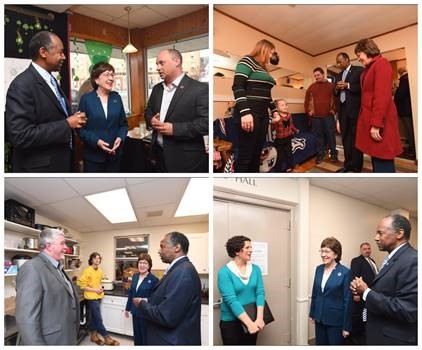Senator Collins and Secretary Carson Visit Youth Organizations and First-Time Homebuyers in Lewiston to Review Housing Programs

Click HERE for high-resolution photo of Senator Collins, Secretary Carson, and Auburn Mayor Levesque
Click HERE for a photo of Senator Collins and Secretary Carson visiting the Edwards’ home
Click HERE and HERE for photos of Senator Collins and Secretary Carson at New Beginnings
Lewiston, ME – U.S. Senator Susan Collins, the Chairman of the Housing Appropriations Subcommittee, hosted U.S. Secretary of Housing and Urban Development Ben Carson in Lewiston today to meet a local family who benefitted from several federal grant programs to purchase and renovate their home, tour the Tree Street Youth Center to discuss their work to promote health and academic achievement among local students, and visit New Beginnings to learn more about their efforts to serve runaway and homeless youth.
“I was delighted to host Secretary Carson in Lewiston today, where we had the opportunity to see firsthand how federal housing programs are improving the health, safety, and overall wellbeing of Mainers and strengthening our communities,” said Senator Collins. “We enjoyed meeting the Edwards, who achieved their dream of homeownership and removed lead hazards from their home with the assistance of several federal grant programs, as well as the hardworking staff and volunteers at Tree Street Youth Center and New Beginnings, who are making a real difference in the lives of countless Maine youth. I look forward to continuing to work with Secretary Carson to ensure our nation’s housing programs have the resources they need to replicate success stories like these in Lewiston across the country.”
“I appreciate Senator Collins’ invitation to see, firsthand, how HUD programs are helping Mainers climb the ladder of opportunity,” said Secretary Carson. “From combatting homelessness, to promoting sustainable homeownership, to making homes healthier, the evidence-based practices and services supported by HUD transform lives and improve communities.”
Senator Collins and Secretary Carson began by meeting with Auburn Mayor Jason Levesque and City Administrator Peter Crichton to discuss Auburn’s Opportunity Zone. Last May, Auburn and Lewiston were among the 32 Maine communities selected to participate in the federal Opportunity Zones program, an economic development program established under the Tax Cuts and Jobs Act of 2017 that provides a federal tax incentive for taxpayers who invest and create jobs in the designated area.
Senator Collins and Secretary Carson then stopped by the residence of Robert and Christina Edwards to see how their family has directly benefited from programs offered by the Department of Housing and Urban Development. The Edwards recently became first-time homebuyers with the help of the HOME Program, which provided down payment assistance, and they used a LIHEAP grant for weatherization projects that improved their house’s energy efficiency. The Edwards also increased the safety of their home for their five-year-old daughter by using grant funding to remove lead paint hazards and a Healthy Homes grant to install an exterior handrail and update the electrical system.
Next, Senator Collins and Secretary Carson toured the Tree Street Youth Center and spoke with various stakeholders about how the Choice Neighborhoods Grant program will help revitalize the Tree Street neighborhood. Lewiston, in partnership with Community Concepts, received a $1.3 million grant through this program last year, which will be used to plan the transformation of the Tree Streets neighborhood by revitalizing HUD-assisted housing and catalyzing critical improvements in the neighborhood, including vacant property, housing, businesses, services and schools. Senator Collins and Secretary Carson also learned about Tree Street Youth Center’s work to create a safe space that encourages healthy physical, social, emotional, and academic development for young people in the community. Due to increased demand, their facility is currently undergoing an expansion with assistance from the Community Development Block Grant program, which will entail a 2,900-square-foot addition and the renovation of 1,400 square feet.
Finally, Senator Collins and Secretary Carson visited the New Beginnings Drop-In Center to speak with staff and program participants about the various services offered by the organization. The Center can accommodate up to 30 youth ages 14-21 who are homeless or at risk of becoming homeless throughout Androscoggin, Kennebec, and Franklin Counties. Participants are provided with comprehensive case management, referrals to local and state agencies, assistance with housing needs and access to shelter, and connection to local educational and employment programs. Street-based services are provided to runaway, homeless, and street youth who have been subjected to, or are at risk of being subjected to, sexual abuse or sexual exploitation. The Center also helps youth and young adults to obtain housing, food, and hygiene supplies. Founded in 1980, New Beginnings provides an essential safety net for 700 children, teens, and adults and receives important funding from the Department of Housing and Urban Development’s Continuum of Care program.
+++
As the Chairman of the Housing Appropriations Subcommittee, Senator Collins has worked to secure robust funding to meet the housing needs of the most vulnerable Americans and to strengthen communities. Earlier this year, legislation she co-authored to make critical investments in housing assistance and economic development was signed into law. Highlights of the legislation include:
- $279 million to combat lead hazards in homes where families with young children reside, $49 million above last year’s level.
- $80 million to support comprehensive efforts to end youth homelessness in urban and rural areas, as well as $20 million for new Family Unification vouchers targeted to youth exiting foster care and at risk of homelessness.
- $3.3 billion for the Community Development Block Grant program, which helps state and local governments promote economic development and job creation.